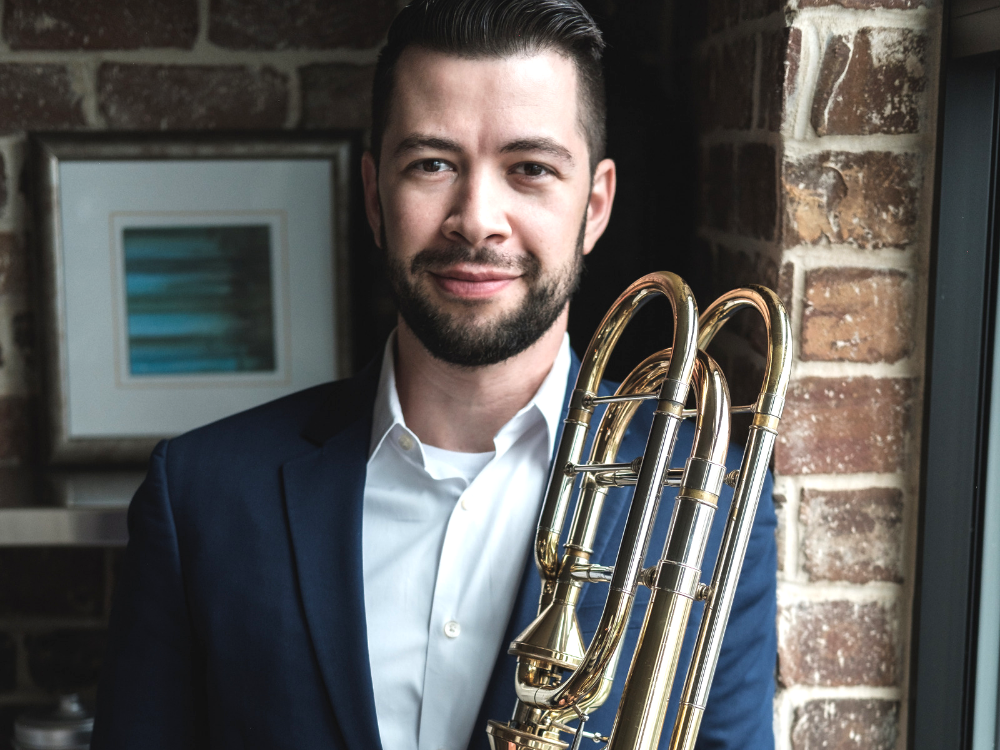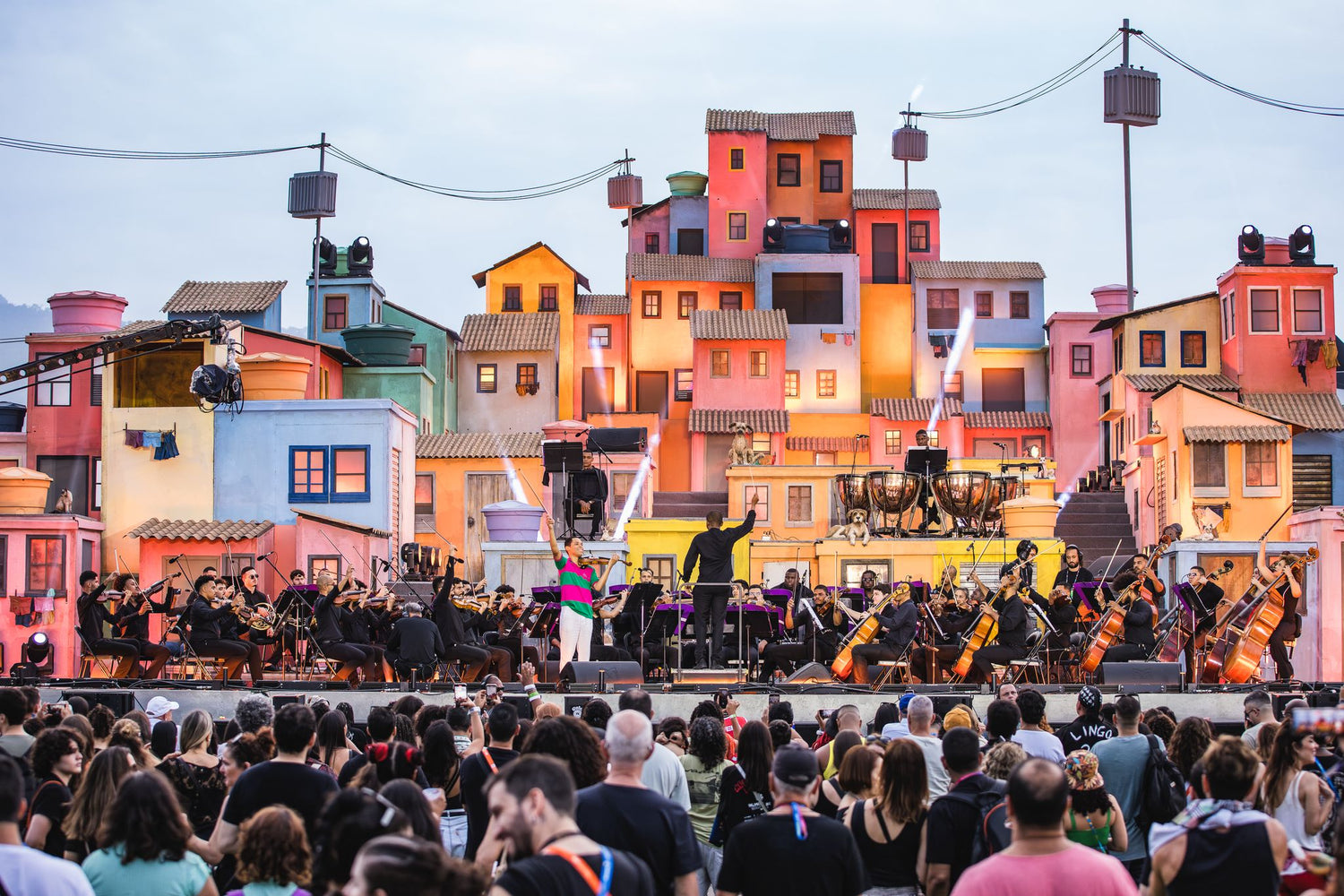A Goldilocks match with the trombone has taken this Atlanta Symphony talent from the military to the main orchestra stage.

By Rachel Watkins
Believe it or not, the trombone actually wasn’t the first choice for Atlanta Symphony Orchestra bass trombonist Brian Hecht. He wanted to play percussion, but his self-proclaimed “terrible coordination” didn’t bode well during his middle-school band test. “So, I started picking cool-looking instruments… the French horn was too small; the sousaphone was too big; but the trombone was just right,” he says.
It was the perfect fit, and he never looked back at that percussion section again.
After graduating with his Master’s degree in music from Northwestern University, Brian won a place in the United States Navy Band, where he would stay for four years before transitioning to an orchestral setting. The Dallas, Texas native is currently in his sixth season with the Atlanta Symphony while maintaining a teaching schedule and traveling the world for master classes and recitals.
Here’s what else he had to say…
What’s your favorite and least favorite part about being a trombonist?
Well, of all the sounds of an orchestra, the trombone is my favorite. So, that’s great because I would hate to have instrument envy. I love making the sounds of a trombone every day.
Sometimes, I do wish we had more notes in symphonies — like in the Handel and Mozart symphonies, for example. So, I guess that would be one drawback.
When did you start playing the trombone and what was your daily practice like?
I started playing in sixth grade, but I was just a typical kid in middle school. I practiced, but it was nothing crazy — maybe 30 minutes a day. But, in eighth grade, I made All-Region Band, so that kind of shifted things for me. At Coppell High School, I was in marching band and spent a lot of time practicing over the summer. We also had rehearsals every day after school for two or three hours. In my junior and senior years, my goal was to make All-State Band and I practiced a lot — even during school lunch hour. If all that hadn’t happened, I might not have become the player I needed to be to get into the undergrad music program at The University of Texas at Austin.
Growing up, what did you think you’d be doing for a career instead of music?
My dad is a cardiologist. So, I toyed with the idea of medical school. In college, I actually went into orientation as a biology major — and then I saw all the books; books that I didn’t want to read. So, music it was! As a kid, I always loved the soundtracks of movies. So, I guess that was an early indication of my future.

Who have been your most influential teachers?
I’ve been fortunate to have so many. Jon Bohls in the Dallas-area to start with; I studied with Dr. Nathanial Brickens at UT-Austin. And, then in my grad school program at Northwestern, I studied with Michael Mulcahy, Charles Vernon, and Peter Ellefson. They’ve served not just as influential teachers, but also as mentors.
" The overall experience of being in the Navy really changed my life "
What led you to join the U.S. Navy Band — and, more importantly, how many pushups can you do?
Haha, well on the pushups, I think I maxed out at about 110 in two minutes. We had periodic physical examinations, so I was always trying to beat the prior goal. As for how I ended up in the Navy, it was a bit by chance. I was finishing my Master’s in 2009, and I started taking auditions like crazy — and I took one for the U.S. Navy Band. The rest is history, as they say. I reported for duty in Washington, D.C. in December 2009 and would go on to do a four-year enlistment. I really wanted to play in an orchestra again, though. So, that’s why I eventually started taking auditions and found my place with the Atlanta Symphony.
What is your favorite story from the Navy?
Getting to march in the Obama inauguration ranks pretty highly — although it was both incredible and a bit painful at the same time. We had to load up at 2 a.m. the morning of the inauguration and wait until our march time at 1 p.m. So, it was a long day! The overall experience of being in the Navy really changed my life; there were a lot of hardening, character-building moments between military funeral honors and other ceremonies, and playing in just-above freezing temps. As long as it was 32 degrees, we were out there.
You’re a member of the Atlanta Symphony now; what’s a typical day like?
I’m definitely in a rhythm now and have followed very much the same schedule for the last eight or nine years when it comes to a daily practice and warmup routine. As for a typical performance day, it goes something like this: I wake up and get breakfast for our toddler daughter and take her to daycare. Our first symphony rehearsal starts at 10 a.m., so I’m in the hall by 9 a.m to warm up. After rehearsal ends at 12:30 p.m., I’ll have lunch and then practice again until 4 p.m. Then, I’ll pick up our daughter; we’ll have dinner, and I’ll head back to the hall to perform at 8 p.m.
How do you juggle time between performance, teaching, and being a husband?
As you could probably tell from my ‘typical day,’ the balancing act requires some planning and sticking to a schedule. When we had our daughter, it definitely took some adjustment to make it all work. But, it really works well now.
We hear your wife, a physical therapist, is launching a new product. Can you tell us more?
My wife is a Physical Therapist that works at The Shepherd Center here in Atlanta. Her old roommate and best friend, Lisa, is a Physical Therapist that works at Walter Reed in Bethesda, Maryland with military vets and active wounded military. She sees a fair number of prosthetic limbs and had the idea for this new company, Soks Prosthetic Apparel. The line will offer personalization and customization options for prosthetic socks - in essence, making them more comfortable and less clinical-looking - as well as other apparel designed specifically for amputees. We've actually been working with some of the designers that work with Coregami and that has been so great. We can't wait to launch in Summer 2019.
" You must learn how to love what’s good for you "
You’re a professor in college. Do you have any advice or recommendations for aspiring young musicians?
Yes, I’m an artist-in-residence at Kennesaw State University. It’s my sixth year there, and I have a studio of six students and co-run the trombone choir with another professor. As for advice, I’d have to say that you must learn how to love what’s good for you. For instance, you’re never going to get better without putting in practice time on the fundamentals — and those aren’t usually what people want to practice. But I always say to make it fun or turn it into a game. I’ve flipped my fundamentals into pop music tunes by creating a playlist in individual keys. It really does work!
Where is the most memorable place you traveled with your trombone?
I’ve been to China and South Korea a few times, and those were great trips. But perhaps one of the coolest experiences I’ve had so far was at the Pacific Music Festival in Sapporo, Japan. They bring in great conductors and playing in the orchestra there for five weeks was unbelievable.
How did you learn about Coregami and what shirt do you wear?
I actually think it was in the Atlanta Symphony locker room! I was complaining about our tails and how constricting the whole outfit was. There was a guy two lockers down who had a Coregami shirt on. He randomly had an extra one and gave it to me to try on. From that point on, I knew I had to order more and have been wearing the Gerswhin shirt ever since.
Learn more about Brian here.





